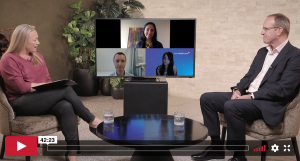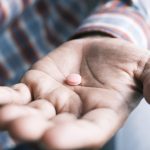Natural medicines in modern healthcare
The natural medicines market is a multi-billion dollar industry. Australia has one of the highest levels of uptake of natural medicines in the developed world with around 44% of people buying vitamins and supplements regularly. It’s clear that a lot of Australians view natural medicines as an important part of managing their health and wellness. However, among the healthcare community, views around natural medicines can be less favorable and more controversial.
This panel looks at the role of natural medicines in modern healthcare. What’s driving the uptake of natural medicines? How are they viewed by patients and healthcare practitioners? And how can technology better support healthcare professionals to integrate natural medicines into treatment?
Panellists:
- Dr Shamistra Barathan – Integrative GP, and Vice-President Australasian College of Nutritional and Environmental Medicine
- Chelsey McIntyre, pharmacist and editor, TRC Natural Medicines, USA
- Andrew Pennington, Integrative GP
- Nigel Pollard, Chairman Natural Health Science Foundation
Key insights
The rise in popularity of natural medicines is undeniable. A recent study found 8.24 million Australians age 14+ buy vitamins, minerals and supplements, which has increased from 7.95 million just four years ago. But what’s driving this rise in popularity?
Although there are many forces influencing this trend, Nigel Pollard, Chairman of the Natural Health Science Foundation, says this largely comes down to three factors: more proactive patients, a growing push for preventative medicine, and convenience.
He points out that it’s often easier to buy an over-the-counter natural medicine than see a doctor in order to address an ailment. And this sort of control over your healthcare comes with a satisfying sense of empowerment.
“When people are able to easily go and buy healthcare products there’s a natural consequence of feeling empowered about your health,” he said.
Integrative medicine’s role in the future of healthcare
The growing use of natural medicines has led to the emergence of a more holistic approach to treatment, where conventional medicine is combined with evidence-based lifestyle, natural and complementary medicine interventions.
There are now a number of doctors who consider themselves “Integrative GPs” offering patients a mix of western and evidence-based complimentary therapies. Once such GP is Dr Shamistra Barathan who is also Vice-President Australasian College of Nutritional and Environmental Medicine.
She believes this integrative approach is a more sustainable model of healthcare, especially as we try to manage the rising wave of chronic conditions. But the current time-pressured consults are not set up to support this model.
“When we think about it, are we actually solving the chronic disease epidemic in five to 10 minute consults?” she questioned. “What it really comes down to it is the patient needs more time with the doctor and more time on health education.”
She warns the current situation is not sustainable and fears we’ll see a huge rise in chronic conditions as a result of the current way we’re treating them.
Integrative GP, Dr. Andrew Pennington backs up this point, saying we’re not spending enough time to properly investigate all the contributing factors for so many of our chronic conditions.
“There’s no question that the role of lifestyle, the role of nutrients, and the role of the environment is so critical in the recovery of so many people.” He points out that only by spending time to learn this information can you appropriately investigate, interpret and treat someone on a holistic level.
And the flipside? He says limiting consults to 10 minutes can lead to GPs making unnecessary investigations.
“We know what happens in that scenario is the doctors order less appropriate investigations, and they rely more heavily on that rather than their history and examination,” he noted.
Rise in popularity tempered with scepticism from the healthcare community
While there is clear support for a more integrative approach to medicine, there are also a large number of healthcare professionals who have concerns about the use of natural medicines.
“There’s certainly a healthy dose of scepticism amongst most doctors,” said Dr Pennington. “You do get quite a number of people, and some quite militantly so, who are very opposed to the use of natural medicines because they believe there’s no evidence and they may be harmful.”
Whether you’re a sceptic or not, the reality is that the majority of patients are using natural medicines, the panel pointed out. Even if we’re not aware of it.
Medical Director’s recent report into Patient Attitudes to Natural Medicines found that 76.6% of people take natural medicines, yet only 43% inform their doctors about it. The panel felt strongly that healthcare professionals need to at least have a working knowledge about natural medicines in order to manage contra indications and adverse events.
Dr. Barathan believes there needs to be greater education and awareness among health professionals, and this can’t happen soon enough.
“I think people are coming to understand the role of nutrients,” she speculated. She pointed out that doctors are more aware of the relationship between natural and western medicine, for example that proton pump inhibitors can lower B12 and the contraceptive pill lowers folate.
“Gradually, it’s working into mainstream medicine, but it’s so slow. We need to speed it up for the sake of our patients,” she urged.
Technology integration crucial to enabling change
The panel felt strongly about the need for technology to support healthcare professionals in integrating natural medicines into their treatment. And while some software providers have started rolling out features to support this, there are many that are lagging.
“I’d like to see our medical software programs have more knowledge of the basic supplements that are around and be able to click them into our practice software like we would a pharmaceutical.”
This is an area that Medical Director has been working towards improving with their recent integration of TRC Healthcare’s Natural Medicines database into their medicines information platform, AusDI.
Chelsey McIntyre, Managing Clinical Editor at TRC Healthcare pointed out their database is one of the only unbiased evidence-based clinical reference databases that’s focused entirely on natural medicines and alternative therapies.
The database provides key information on safety, adverse effects, effectiveness, typical dosing, and interactions. It then provides “level of evidence” ratings for both safety and effectiveness to guide clinicians at the point of care.
“Now that information is right there alongside information for conventional treatments, it will allow practitioners to find all that information in the same place and provide better evidence-based recommendations for their patients,” Ms McIntyre said.
Consumer-led change is underway
While the sentiment around natural medicines is currently mixed, the panel agreed that increased uptake among consumers will drive thinking and behaviour around natural medicine in the future.
Dr. Pollard predicts that more “mainstream” doctors will embrace natural health products – not because they are passionate about them, but because they have to.
“At the end of the day, one in two of their patients is already taking natural medicines and people want to know which product to use,” he reasoned.
Dr Pollard says it’s simply a question of time and the evolution of people’s knowledge. He agrees with the panellists that education will be the driver of effective treatment using natural medicines.
“I think rigorous, independent training to help people provide solutions for patients is really critical. And then it will become a self-fulfilling situation,” he concluded.










